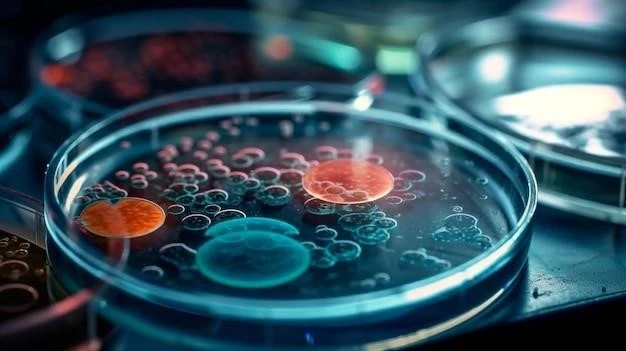Galactose-1-phosphate Uridylyltransferase Deficiency
Genetic disorder impacting Galactose-1-phosphate uridyltransferase, enzyme deficiency causing metabolic disorder; vital newborn screening for early detection.
Introduction to Genetic Disorders
Genetic disorders are conditions caused by abnormalities in an individual’s DNA. Galactose-1-phosphate uridylyltransferase deficiency is a genetic disorder that affects the body’s ability to process galactose, leading to serious health complications. Understanding genetic disorders is crucial for identifying and managing conditions like Galactosemia.
Understanding Galactosemia
Galactosemia is a rare genetic disorder characterized by the body’s inability to break down galactose, a sugar found in milk and dairy products. This results from deficiencies in enzymes like Galactose-1-phosphate uridyltransferase, leading to metabolic issues. Proper understanding of Galactosemia is essential for diagnosis and management of this condition.
Enzyme Deficiency and Metabolic Disorder
Galactose-1-phosphate uridyltransferase deficiency leads to impaired galactose metabolism٫ causing a cascade of metabolic disruptions. Without this enzyme٫ galactose cannot be properly processed٫ leading to the accumulation of toxic byproducts. This metabolic disorder can result in various health complications affecting multiple organ systems٫ emphasizing the critical role of enzymes in maintaining metabolic balance.
Causes of Galactose-1-phosphate Uridylyltransferase Deficiency
The primary cause of Galactose-1-phosphate uridyltransferase deficiency is inherited genetic mutations affecting the GALT gene. These mutations disrupt the production or function of the enzyme essential for galactose metabolism. As an autosomal recessive disorder, the presence of two mutated copies of the gene is necessary to develop this deficiency. Understanding the genetic basis of this condition is crucial for accurate diagnosis and genetic counseling;
Symptoms and Effects
Galactose-1-phosphate uridyltransferase deficiency can manifest with various symptoms and effects. These may include liver damage٫ cataracts٫ hypoglycemia٫ jaundice٫ and developmental delays. The inability to metabolize galactose properly leads to these issues٫ emphasizing the diverse impact of this metabolic disorder on different parts of the body.
Liver Damage
Liver damage is a common effect of Galactose-1-phosphate uridyltransferase deficiency. The accumulation of galactose and its toxic byproducts in the liver can lead to hepatomegaly, liver fibrosis, and liver failure. Timely diagnosis and management are crucial to prevent or minimize the severity of liver damage in individuals with this metabolic disorder.
Cataracts
Cataracts are a common ocular complication associated with Galactose-1-phosphate uridyltransferase deficiency. The accumulation of galactitol, a metabolite of galactose, can lead to the formation of cataracts in the lens of the eye. Early detection and intervention are essential to manage cataracts and preserve vision in individuals with this metabolic disorder.
Hypoglycemia
Hypoglycemia, or low blood sugar, can occur in individuals with Galactose-1-phosphate uridyltransferase deficiency due to disrupted galactose metabolism. Insufficient galactose breakdown can lead to decreased glucose production and utilization, resulting in hypoglycemic episodes. Monitoring blood sugar levels and timely interventions are crucial to manage hypoglycemia in individuals with this metabolic disorder.
Jaundice
Jaundice, characterized by yellowing of the skin and eyes, is a common symptom of Galactose-1-phosphate uridyltransferase deficiency. The buildup of toxic byproducts due to impaired galactose metabolism can lead to liver dysfunction and elevated bilirubin levels٫ resulting in jaundice. Early detection and management of jaundice are essential to prevent further complications in individuals with this metabolic disorder.
Developmental Delays
Developmental delays, including cognitive and motor impairments, are observed in individuals with Galactose-1-phosphate uridyltransferase deficiency. The impact of impaired galactose metabolism on brain development can lead to delays in reaching developmental milestones. Early intervention٫ therapies٫ and support are crucial in addressing and managing developmental delays in individuals affected by this metabolic disorder.
Diagnosis and Newborn Screening
Diagnosing Galactose-1-phosphate uridyltransferase deficiency involves genetic testing to identify mutations in the GALT gene. Newborn screening programs play a crucial role in early detection٫ enabling prompt intervention to prevent complications. Screening tests measure enzyme activity levels or genetic markers٫ aiding in the diagnosis of this metabolic disorder. Timely identification through newborn screening is essential for initiating timely treatment and dietary management.
Treatment Options

Treating Galactose-1-phosphate uridyltransferase deficiency involves a strict galactose-free diet to avoid galactose intake. Individuals with this metabolic disorder need to eliminate sources of galactose, such as milk and dairy products, from their diet. Monitoring galactose tolerance and adhering to a galactose-free diet is essential to prevent complications and maintain health. Dietary management is the cornerstone of treatment for individuals with Galactosemia.
Galactose-Free Diet
A galactose-free diet is essential for managing Galactose-1-phosphate uridyltransferase deficiency. This diet involves avoiding foods containing galactose, such as dairy products, fruits, and legumes. Individuals must carefully read food labels and work with healthcare providers and dietitians to ensure their diet is free of galactose. Adhering to a strict galactose-free diet is crucial in preventing the harmful effects of galactose intake in individuals with this metabolic disorder.
Galactose Tolerance
Galactose tolerance varies among individuals with Galactose-1-phosphate uridyltransferase deficiency. Some individuals may have a degree of tolerance to small amounts of galactose, while others require a strict galactose-free diet. Monitoring galactose tolerance through careful observation of symptoms and regular medical assessment is important in determining the appropriate dietary restrictions for each individual. Personalized management based on galactose tolerance levels is key in optimizing the health outcomes of individuals with this metabolic disorder.
Management of Galactosemia
The management of Galactosemia primarily focuses on dietary modifications to avoid galactose intake. Individuals with Galactose-1-phosphate uridyltransferase deficiency must adhere to a galactose-free diet to prevent the accumulation of toxic byproducts. Regular monitoring of galactose tolerance, nutritional counseling, and medical follow-ups are essential components of managing this metabolic disorder. Close collaboration with healthcare providers and dietitians is crucial in developing a comprehensive management plan tailored to the needs of each individual with Galactosemia.
Other Forms of Galactosemia
Aside from Galactose-1-phosphate uridyltransferase deficiency, there are other forms of Galactosemia caused by different enzyme deficiencies. These include Gal-1-PUT deficiency, Galactokinase deficiency, and UDP-glucuronosyltransferase deficiency. Each type results in the impaired breakdown of galactose, leading to metabolic disturbances and health complications. Understanding the distinct characteristics of these forms of Galactosemia is crucial for accurate diagnosis and appropriate management strategies.
Gal-1-PUT Deficiency
Gal-1-PUT deficiency, also known as Galactosemia type I, is characterized by a lack of Galactose-1-phosphate uridyltransferase enzyme activity. This enzyme deficiency hinders the conversion of galactose-1-phosphate to glucose-1-phosphate, leading to the buildup of galactose and toxic metabolites. Individuals with Gal-1-PUT deficiency require a galactose-free diet and lifelong management to prevent complications associated with galactose metabolism impairment.
Galactokinase Deficiency
Galactokinase deficiency is a type of Galactosemia caused by inadequate activity of the galactokinase enzyme. This enzyme is essential for the initial step in galactose metabolism, converting galactose to galactose-1-phosphate. Without proper galactokinase function, galactose accumulates in the body and can lead to cataracts and other complications. Management involves a galactose-restricted diet and close monitoring of symptoms to prevent adverse effects of galactose buildup.
UDP-Glucuronosyltransferase Deficiency
UDP-Glucuronosyltransferase deficiency is another type of Galactosemia resulting from impaired activity of the UDP-glucuronosyltransferase enzyme. This enzyme plays a crucial role in the conjugation of toxic compounds, including galactose metabolites, for elimination. Individuals with UDP-Glucuronosyltransferase deficiency may experience jaundice and liver problems due to the buildup of toxic substances. Management involves dietary restrictions and medical interventions to mitigate the effects of impaired UDP-glucuronosyltransferase activity.
Living with Galactosemia⁚ Challenges and Support
Living with Galactosemia poses various challenges due to the need for strict dietary management and monitoring. Individuals with Galactose-1-phosphate uridyltransferase deficiency must navigate daily life avoiding galactose-containing foods while ensuring proper nutrition. Support from healthcare professionals, dietitians, and support groups is crucial in helping individuals cope with the physical, emotional, and social challenges associated with managing Galactosemia. Education, advocacy, and access to resources play vital roles in providing comprehensive support for individuals living with this metabolic disorder.
Research and Future Perspectives
Research on Galactose-1-phosphate uridyltransferase deficiency continues to explore novel treatments, advancements in genetic testing, and improved management strategies. Future perspectives include gene therapies, enzyme replacement therapies, and targeted interventions to address the underlying metabolic disturbances in individuals with Galactosemia. Collaborative efforts among researchers, healthcare providers, and advocacy groups aim to enhance diagnostic methods, treatment options, and ultimately improve the quality of life for individuals affected by this inherited metabolic disorder.
Conclusion⁚ The Impact of Galactose-1-phosphate Uridylyltransferase Deficiency as an Inherited Condition
Galactose-1-phosphate uridyltransferase deficiency is a significant inherited metabolic disorder with diverse effects on multiple organ systems. This condition requires lifelong dietary management and close monitoring to prevent complications and promote well-being. Advances in research and genetic testing offer hope for improved diagnosis and personalized treatment approaches. By raising awareness٫ providing support٫ and advancing scientific knowledge٫ the impact of Galactosemia as an inherited condition can be better understood and managed to enhance the quality of life of individuals affected by this disorder.
